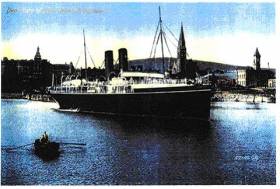Displaying items by tag: Book Launch
Book Launch: The Last Voyage of the Leinster - Dun Laoghaire Club Tonight, 9 November
#BookLaunch - An Cathaoirleach of Dun Laoghaire-Rathdown County Council Councillor Tom Murphy, will officially launch this evening, 9 November, the centenary book of the Irish Sea 'mail-boat' steamer RMS Leinster.
The launch of the book “The Last Voyage of the Leinster” published by the Mail Boat Leinster Centenary Committee with assistance from DLR County Council takes place in the Dún Laoghaire Club (off Marine Road) 3 Eblana Avenue beginning at 7.30p.m. The event is free and all are welcome to attend.
The 2,640 gross tons RMS Leinster having during the last year of WW1 was struck by torpedo from German U-Boat 123 while on passage from Kingstown (now Dun Laoghaire) and Holyhead. The sinking took place 16 miles offshore on 10 October 1918 and led to the loss of officially 501 people out of the 771 on board, making the incident one of the greatest ever loss of life in the Irish. In addition the tradgedy marked the highest ever casualty rate on an Irish owned ship.
The mail-boat and passenger steamer, RMS Leinster operated by the City of Dublin Steam Packet (see piece) commanded by Captain William Birch had a 76 crew drawn from both the Irish Sea ports. Also working on board were 22 personnel from Dublin Post Office,in the ship's onboard postal sorting room. As for the passengers, there were 180 civilians, men, women and children. Most of them were from Ireland and Britain.
By far the greatest number of passengers on board RMS Leinster (painted in camouflage) were military personnel from Ireland, Britain, Canada, the US, Austrlia and New Zealand. Many of them were going on leave or returning from leave. Research to date has revealed the names of 529 casualties, more than the official total lost.
A week after UB-123 carried out the attack on RMS Leinster, the submarine while returning to Germany, was struck a mine in the North Sea. Commander Robert Ramm and all of his young crew were lost.
The RMS Leinster built in 1897 at Laird Brothers, Birkenhead and was then one of the fastest ships at sea with a speed of 24 knots. The remaining sisters of the quartet named after the Irish provinces were the Connacht, Munster and Ulster.
The official site of the RMS Leinster (click here) is dedicated to remembering those who died on the R.M.S. Leinster and UB-123. It is also dedicated to the people who survived the Leinster sinking and those who rescued them. We would love to hear from you if you have information on anyone who was caught up in the sinking or its aftermath.
Next year the Mail Boat Leinster Centenary Committee will commemorate the centenary of the sinking of RMS Leinster on the 100th aniversary, 10 October 2018. Plans to mark the centenary are underway. If you would like to be kept informed as plans develop, please contact us at [email protected]
For further information check the 100th Anniversary section here.
'Titanic Port’ Book Launched
A new book celebrating 400 years of the development of Belfast Harbour was launched on Monday in the offices of Belfast Harbour Commissioners. 'Titanic Port' was written by award-winning journalist and author Alf McCreary, and was commissioned by the port authority. For a full account of the book launch please click here (which includes a link to a podcast by the author).
The book tells the story of those who built the harbour and the foundations for Belfast's emergence as a major urban and commercial centre. The book traces the harbour records, dating back to 1613 when King James I authorised the construction of a small wharf on the river Lagan.
At over 400 pages long, 'Titanic Port' also contains over 700 illustrations, many previously unseen photographs and paintings from the harbour's archives, including panoramic port and city views.
A central theme of the book is the intimate relationship between Belfast and its harbour and how the Belfast Harbour Commissioners were instrumental in bringing shipbuilding to the city. In particular, how they helped ensure that Titanic and her sister ships, Olympic and Britannic were built at Queen's Island. In addition the Commissioners investment of the Thompson Dock, where the trio of iconic liners were fitted out, was the largest of its kind in the world.
The cost of the dock was almost the same price as the Titanic and was specifically built to help Harland & Wolff secure the contract from the ships' owners, the White Star Line.
'Titanic Port' also follows the development of the Jacobean and Georgian port which was barely navigable due to Belfast Lough's treacherous mud-banks and sandbanks. Without the creation of a navigable channel over the centuries by successive harbour authorities, it is arguable that Carrickfergus might have become Ulster's main seaport.
Also examined is the vital role the harbour during both World Wars I and II and how the Harbour Estate escaped the worst of the 'Troubles' and its recent re-emergence as a major economic driver for Northern Ireland's economy. The social history of Belfast is also explored and how it influenced the port, in particular, Sailortown.
'Titanic Port' is currently on sale priced £25 (stg) and available online at http://www.titanicport.comThe book was produced by Dr. Claude Costecalde of Booklink and designed by Wendy Dunbar.
For information in general about Belfast Harbour Commissioners logon to www.belfast-harbour.co.uk/

























































